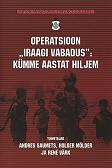INIMÕIGUSTE KAITSE JA SELLEGA SEOTUD PROBLEEMID IRAAGIS
CHALLENGES AND PROBLEMS CONCERNING HUMAN RIGHTS PROTECTION IN IRAQ
Author(s): Mart Nutt, Viljar VeebelSubject(s): Law, Constitution, Jurisprudence
Published by: Kaitseväe Ühendatud Õppeasutused
Keywords: Human rights; Iraq; humanitarian intervention
Summary/Abstract: Iraq has been struggling with the issue of human rights protection since its independence in 1932, and its complicated history, ethnic and religious tensions have made building a sustainable human rights protection system problematic. There was a hope for progress in terms of human rights in the year 2003, when democracy was re-established and Saddam Hussein was removed from power, but more than ten years later, the situation is just as problematic, and only the violations are different. To some extent, the roots of human rights protection problems lie in the traditional Iraqi perception of society, where human rights are continually breached on ethnic, religious, sexual and political grounds. Many violations happen because of a lack of knowledge of human rights and the lack of access to education. The government of Iraq has not been able to ensure effective control over their territory, and no real desire to deal with the protection of human rights can be observed. The last elections in Iraq were declared free and fair, but democracy and especially the rule of law in Iraq leaves much to be desired. There are continuous problems with low administrative capacity, violence and corruption, and an inability, and, in some cases, a reluctance of the government to protect human rights. As a result the government does not safeguard even most basic human rights. It is increasingly evident that a democratic government alone is not enough to ensure human rights in a situation where human rights are violated by almost all of the political, ethnical and religious groups sharing the power in Iraq. As a result the prospects of positive developments in the area of human rights in Iraq in the coming years are extremely small. When we assess the future possibilities for ensuring human rights, we need to keep in mind that in the year 2013, Iraq continues to be a country, where the human rights situation is one of the worst in the world. The withdrawal of foreign military forces has rather changed the human rights situation in Iraq for the worse, because there are now fewer institutions that can ensure human rights, and the administrative incapacity has increased. International partners (including Estonia), need to take a critical look in the mirror and continue to take steps toward greater responsibility and positive action in terms of human rights awareness and protection in Iraq. Writing negative reports can raise awareness of the problems in Iraq, but in bringing knowledge, expertise and fi nancial assistance is that what can improve the situation in practice.
Journal: KVÜÕA toimetised
- Issue Year: 2014
- Issue No: 18
- Page Range: 96-117
- Page Count: 22
- Language: Estonian

